At Website Rating, we pride ourselves on providing up-to-date and reliable information on industry-leading tools and services used for starting, running, and growing an online business. Here is our process and methodology for evaluating and reviewing tools and services listed on Website Rating, which we use to determine their rankings.
We are real people, just like you. Learn more about the team behind websiterating.com here.
Our goal is to provide beginner-friendly, in-depth reviews and comparisons so that everyone can make informed decisions and make the most of their online presence.
To achieve this, we’ve developed a careful review process that helps us maintain consistency, transparency, and objectivity. Here’s how we evaluate each product and service:
It’s important to note that we do not accept payment to review products or services. Our reviews are unbiased and solely based on our evaluation of the product or service. We use the affiliate marketing model, which means we may earn a commission if you purchase a product or service through one of our links. However, this does not affect our review process or the content of our reviews. We strive to provide honest and accurate information to help you make informed decisions when choosing products or services. You can read our affiliate disclosure here.
Our Evaluation Process
Website Rating’s evaluation process covers eight key parts of the entire user buying experience:
1.) Purchasing and downloading; 2.) Installation and setup; 3.) Security and privacy; 4.) Speed and performance; 5.) Key unique features; 6.) Extras or bonuses; 7.) Customer support, and 8.) Pricing and refund policy.
We research and analyze these areas to create comprehensive and valuable reviews. This applies to:
- Web Hosting Services
- Website Builders
- VPNs
- Password Managers
- Cloud Storage Services
- Email Marketing Tools
- Landing Page Builders and Funnel Builders
It’s important to note that while we have a standardized review process, we sometimes have to tweak it based on the specific software category we’re reviewing.
For instance, we prioritize user-friendliness and design when reviewing a website builder. On the other hand, when reviewing a VPN, our focus is on privacy and security. This is because different software categories have different priorities and objectives, so we need to adjust our review process accordingly.
Ultimately, our goal is to provide comprehensive and unbiased reviews that help users make informed decisions about the software products they use. By tailoring our review process to each category, we can provide a more nuanced analysis of the software, highlighting the factors that matter most in that particular context.
1. Purchasing and Downloading
We start by researching all available plans and usually purchase the most popular ones. We avoid using free trials as they often don’t provide access to the whole package. We focus on the download and assess the installation file’s size to inform you how much free storage space you need.
Once we pay for the tool, then we focus on the download. Obviously, some tools don’t require any file downloading to be used (for example, some of today’s best website builders are online, meaning there are no downloadable software elements).
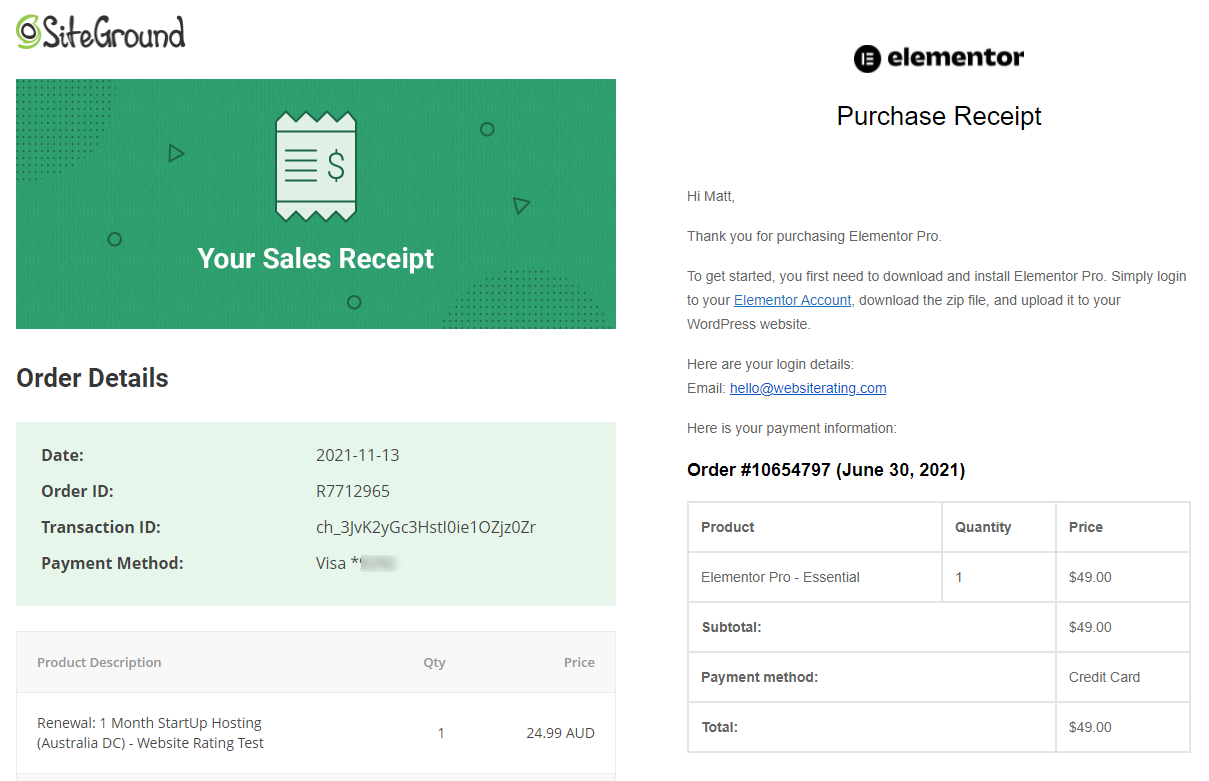
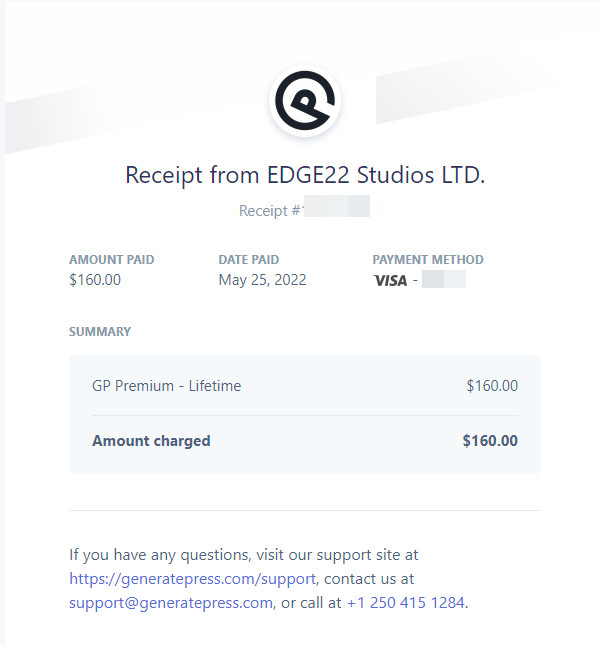
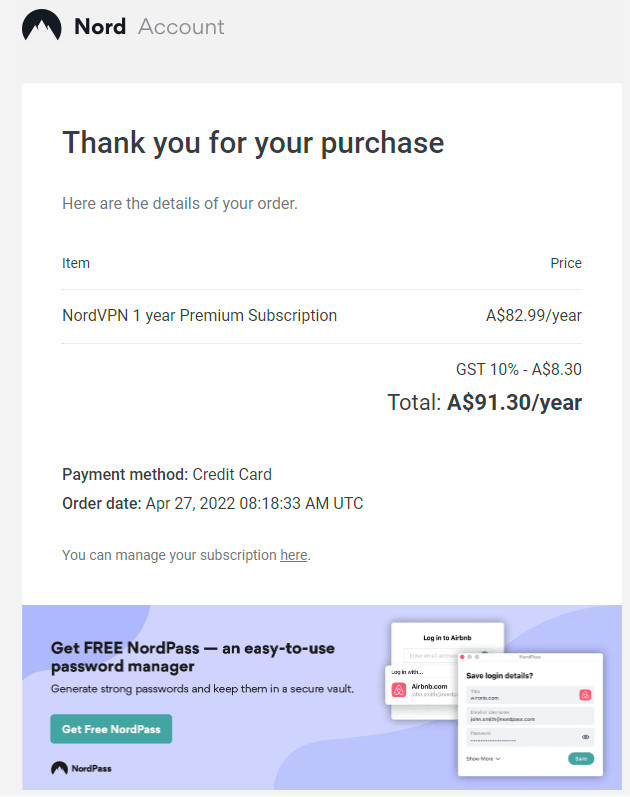
Example of purchase receipts from tools we use, and review on our site
2. Installation and Setup
During this stage, we run the installation script, take care of all the setup details, and assess the time it takes to complete this action. We also pay attention to the level of technical knowledge needed to execute this step successfully.
3. Security and Privacy
We spend a lot of time on this step. We explore the set of security and privacy measures the product developer/service provider implements as well as its regulatory compliance status.
However, the specific security and privacy features you should look for can vary depending on the type of product or service you’re considering. For example, the key security and privacy considerations for web hosting is different from VPNs, cloud storage, and password managers.
When considering security and privacy features of web hosting, some important factors to consider are:
- SSL certificate/TLS encryption: SSL/TLS encryption is important for protecting data transmitted between the website and its users. It ensures that all data exchanged between the user’s browser and the web server is encrypted and secure.
- Firewall protection: A firewall is a network security system that monitors and controls incoming and outgoing network traffic based on predetermined security rules. It helps prevent unauthorized access to a website’s server.
- Malware protection: Malware refers to malicious software designed to harm or exploit a computer system. Web hosting providers should have tools in place to detect and remove malware from websites hosted on their servers.
- Backups: Regular backups of a website’s data and files are essential for data recovery in the event of a security breach or data loss.
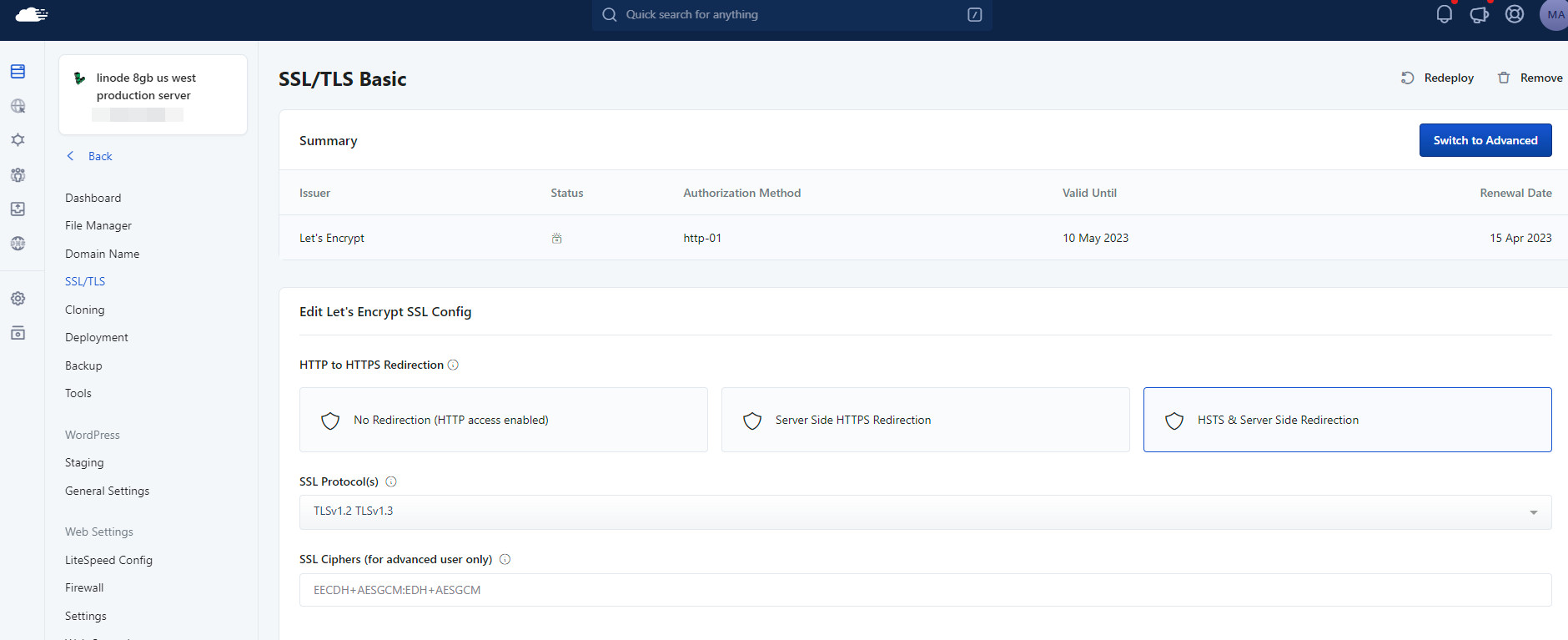
When considering the security and privacy features of VPNs, some important factors to consider are:
- Encryption: VPNs encrypt all internet traffic between the user’s device and the VPN server, making it much more difficult for anyone to intercept or eavesdrop on internet traffic.
- Protocols: The security protocols used by a VPN provider can greatly impact the level of security and privacy offered. Some popular protocols include OpenVPN, L2TP/IPSec, and PPTP.
- Kill switch: A kill switch is a feature that automatically disconnects the user’s internet connection if the VPN connection is lost. This helps prevent data leaks in the event of a dropped VPN connection.
- No-logs policy: A no-logs policy means that the VPN provider does not keep any logs of the user’s online activity, ensuring that user activity cannot be traced back to them.
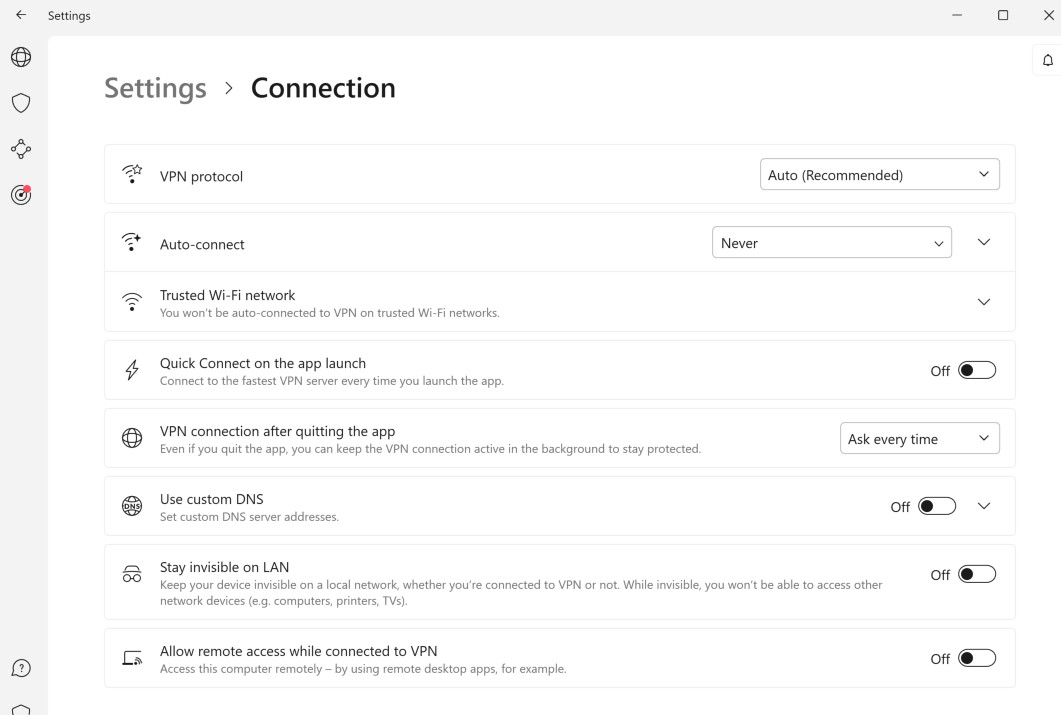
When considering security and privacy features of cloud storage, some important factors to consider are:
- Encryption: Similar to VPNs, cloud storage providers should encrypt all data stored on their servers to ensure that user data is secure.
- Two-factor authentication (2FA): Similar to web hosting, 2FA adds an additional layer of security to the login process by requiring users to provide two forms of authentication.
- Backup and recovery: Regular backups and a robust recovery system are essential for data recovery in the event of a security breach or data loss.
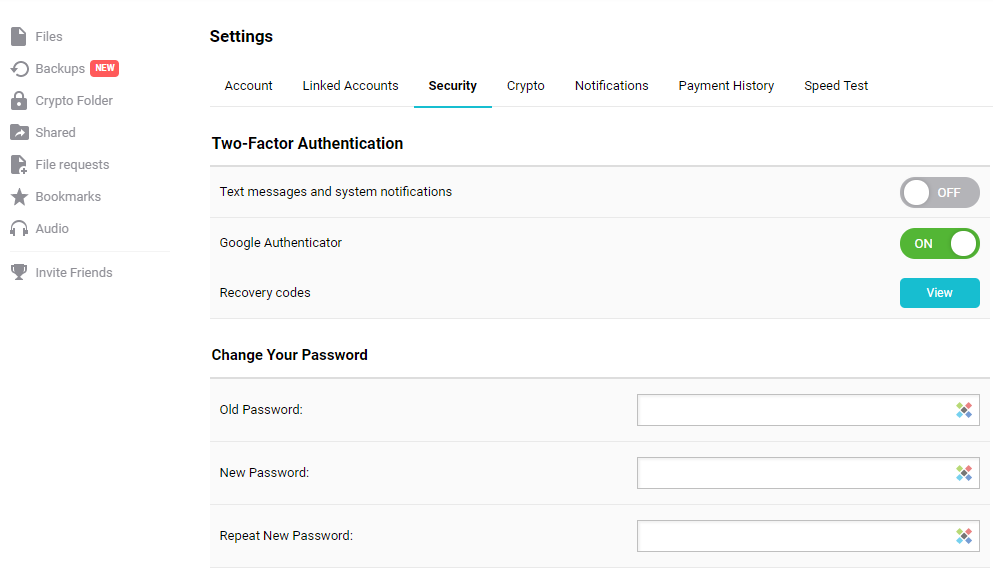
When considering the security and privacy features of password managers, some important factors to consider are:
- Encryption: Password managers should use strong encryption to protect user passwords and other sensitive data.
- Two-factor authentication (2FA): As with other security-focused tools, 2FA adds an extra layer of security to the login process.
- Audit logs: Audit logs allow users to see when and how their password manager data has been accessed, helping them detect any unauthorized access to their accounts.
4. Speed and Performance
Speed is king in the online world. We run web server speed tests and incorporate the results in our reviews. When sharing the results with you, we explain what the numbers mean and provide recommendations for improvement if necessary.
When sharing the results of our speed tests with you, we explain what the numbers mean and compare them with the industry average so we can assess the web hosting company’s performance.
When reviewing cloud storage services, we focus on the upload speed, the download speed, and, of course, the syncing speed.

For uptime and speed testing of the web hosting providers we monitor, visit https://uptimestatus.websiterating.com/
5. Key Unique Features
We thoroughly explore each product’s main features and assess how they perform in real-world situations. We provide detailed information on each feature and explain how it can benefit you.
For instance, an email marketing service should provide you with pre-built, mobile-friendly, and customizable email templates so you don’t have to create emails from scratch, but you can still make changes to fit your vision. On the other hand, a password manager should always allow you to store passwords.
To help you understand the functionality and value of the product/service we’re reviewing, we include screenshots of its key features in the respective review. More often than not, we take these screenshots inside the tool/app/platform so you can see exactly what you’ll get if you decide to invest in it.
6. Extras
In this step, we explore any additional features or add-ons offered by the product or service. We assess their usefulness and provide recommendations on which ones are worth considering.
Let’s take, for example, website-building platforms. Helping their users create beautiful and functional sites with little to no coding knowledge is their primary purpose.
Typically, they accomplish this by providing their customers with a large selection of professionally-designed and customizable website templates, an intuitive drag-and-drop editor, an image gallery, and a blogging tool.
However, extras like free web hosting, free SSL security, and a free custom domain name can significantly increase the value of a website builder as it will practically offer the whole package.

7. Customer Support
Customer support is a crucial part of any product or service. We evaluate the level of customer support provided and assess how helpful and responsive the support team is.
When reviewing a product/service, we look at all the different ways the respective company’s customer care agents can be reached. The more forms of customer support, the better. Aside from live chat and email assistance, we also value phone support. Some people want to hear the voice of the person helping them solve their issues rather than reading their words.
We determine the quality of a company’s customer support by asking its agents multiple questions, looking at their response times, and assessing the usefulness of each response. We also pay attention to the attitude of the experts we communicate with. Nobody wants to ask for help from a cold or impatient person.
Customer support can be passive, too. We are, of course, talking about a company’s knowledge base through articles, how-to video tutorials, ebooks, and FAQs. These resources can help you understand the basics and reduce your need for expert assistance.
8. Pricing and Refund Policy
When reviewing a product or service, it’s essential to take a close look at the pricing and refund policy. Pricing can vary significantly among products and services, and it’s important to ensure the cost is reasonable and competitive with other similar offerings on the market.
In addition to evaluating the pricing, it’s essential to look at the refund policy. A good refund policy should offer customers a fair and reasonable period of time to try out the product or service and determine if it’s a good fit for their needs. If a customer is unsatisfied with the product or service, they should be able to request a refund and receive their money back easily.
When reviewing a product or service, we carefully evaluate the pricing and refund policy to ensure that they are fair and reasonable. We also consider factors such as the length of the refund period and any fees associated with processing refunds.
Sometimes, a product or service may offer a free trial period or a money-back guarantee. These can be valuable options for customers who want to try out a product or service before committing to a purchase. We take these factors into account when evaluating the pricing and refund policy of a product or service.
Summary
As you can see, we do the heavy lifting, so you don’t have to. Our independent research and review team explores products and services from the inside because we don’t like taking anyone’s word for it.
You can rest assured that we’ll expose all the major weak spots of the products and services on our site, make honest recommendations, and never waste our time on tools, apps, and platforms that don’t meet our quality standards.
